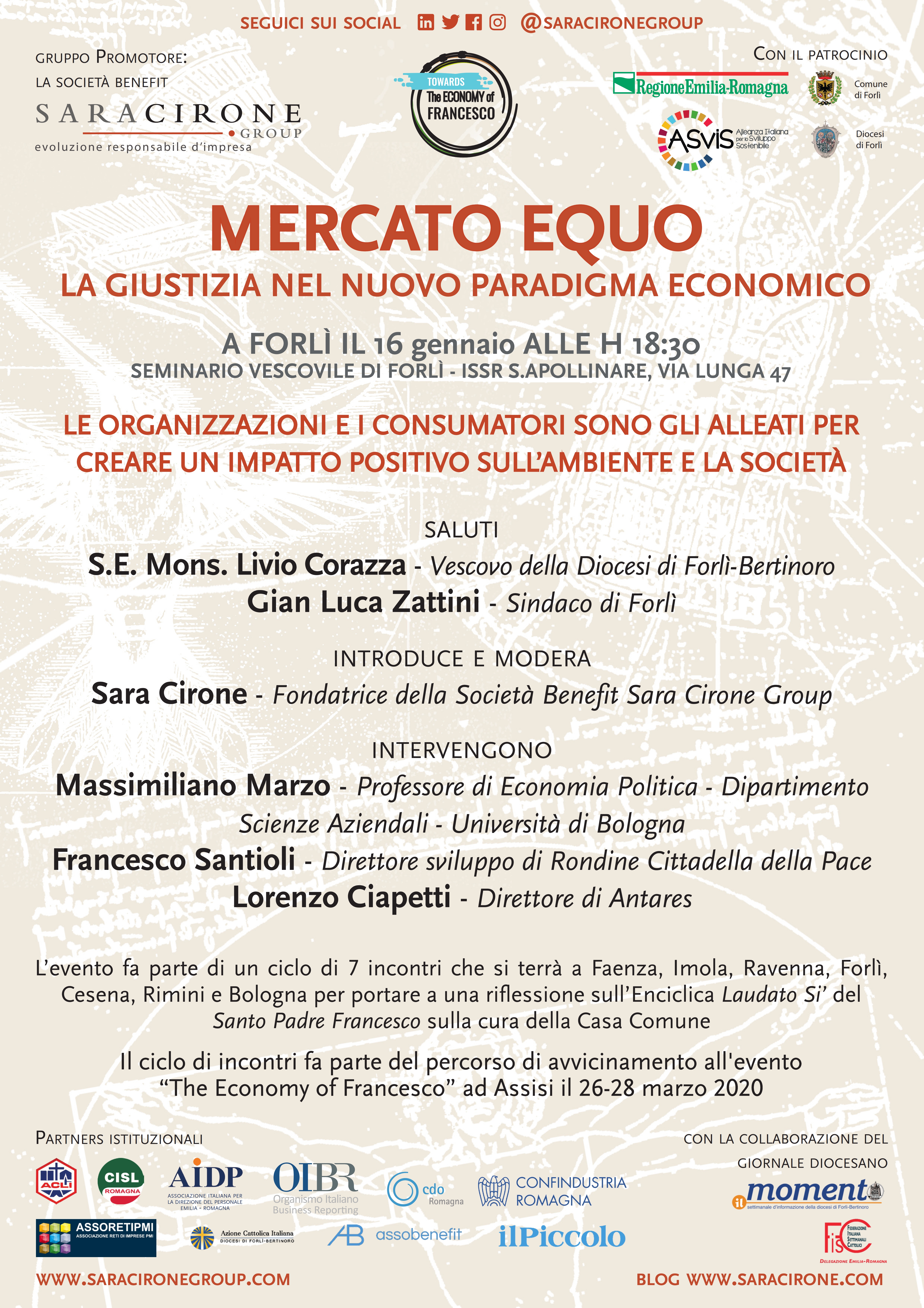FAIR MARKET
JUSTICE IN THE NEW ECONOMIC PARADYGM
FORLI’ the 16th January at 18.30
EPISCOPAL SEMINARY OF FORLI’ – ISSR S. APOLLINARE, VIA LUNGA 47
“When at the centre of the system there is no more man but money, men and women are no longer considered as persons, but as instruments of a logic of “the waste” that produces deep inequalities”. These words of Papa Francesco describe what happens when between economy and ethic there is a separation. It’s a detachment that develops very serious problems for the whole society, the human family and the environment.
The justice of a new economic paradigm
Old and new forms of poverty progress, the inequalities become more and more pronounced as a consequence of an ethic, social and anthropologic global crisis. So, it’s also essential to put in the centre of the debate the theme of justice and what the new economic paradigm should be. That’s why the fourth step of the roadshow “For the Common Good” promoted by Sara Cirone Group Benefit Society in partnership with several associations, in collaboration with FISC Federation of Catholic Weekly Magazines and with the support of the Emilia Romagna Region and of the Italian Alliance for the sustainable Development will be dedicated to these themes. The event, that will be plastic free, will take place at the Archdiocesan Seminary of Forlì the 16th January 2020 and it will be titled “Fair Market. The justice in the new economic paradigm”.
After the greetings by S.E. Mons. Livio Corazza, Bishop of Forlì-Bertinoro and by Mayor Gian Luca Zattini, mayor of Forlì, will speak on this issue Massimiliano Marzo, Professor of Political Economy – Department of Economics and Management at the Bologna University; Francesco Santioli, development director of Rondine Cittadella della Pace; Lorenzo Ciapetti, director of Antares.
The fair market as model of the integral ecology
The fair market is the one that pursues the good of all, that doesn’t consider the man as a simple economic agent and the company as an entity dedicated to the production of goods and services for the purpose to maximize profits, but that supports the vision of an integral ecology, bearer of a real Sustainability from many points, the same that Papa Francesco indicates as the way to follow for the future of humanity and that, in order to find its own full development and to create a positive impact on the environment and on the society, finds its allies in the organisations and in the consumers.
There will be no peace without a fairer economic system
As Papa Francesco has written in recent days in his Message for the World Day of Peace 2020, “the separation between the members of a society, the increase in social inequalities and the refusal to use the instruments for an integral human development endanger the pursuit of the common good. On the contrary, the patient work based on the power of word and of truth can engender in peoples the capacity of compassion and creative solidarity. (…) there will never be real peace if we won’t be able to build a fairer economic system. As Benedetto XVI wrote ten years ago in his Encyclical Letter Caritas in veritate: “The victory of the underdevelopment requests to take action on the improvement of the transactions based on the exchange, on the transfer of the public care facilities, and, above all, on the progressive opening, in a global context, to forms of economic activities characterised by allowances of gratuity and fellowship”.
We need an ecological conversion
Papa Francesco writes: “Because of the consequences of our hostility towards the others, of the failure to comply with the common house and of the abuse of the natural resources – considered as useful instruments only for the today’s profit, without the respect for the local communities, for the common good and for nature – we need an ecological conversion.” So, we need to implement as soon as possible the solutions that can lead us towards models of life and of consumption that are able to promote the flowering and the stay of the life in the future and to develop the common good of the whole human family. So, in this sense, the choices of organisations and consumers are crucial for a new perception of life, that results in “the joyful simplicity of the sharing” and in an ecological conversion seen in “an integral way, as a transformation of the relationships with the other living beings, with creation in its very rich variety”. In Forlì, we will see how it is possible to lay the foundations to find concrete solutions about the territory to these themes that are so important for the future of our civilisation.
